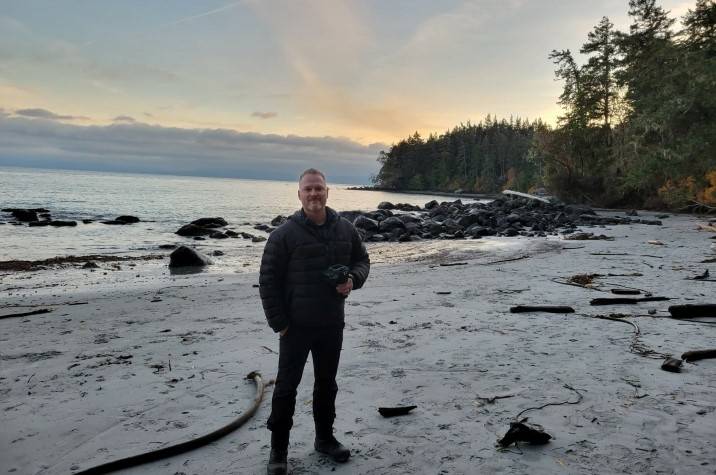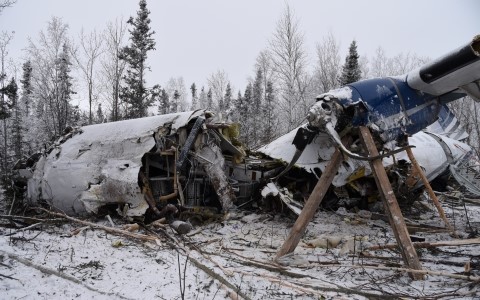RCMP National Reintegration program helps officers return to work after trauma
By Mara Shaw

Corporal Mark Ryttergaard starts a new chapter with the supports in place to help him succeed.
Image by RCMP
June 24, 2025
Content
This article discusses topics related to death, trauma, and post-traumatic stress disorder, which may be distressing to some readers.
After nearly two decades in uniform, RCMP Corporal Mark Ryttersgaard is no stranger to high-stress calls. Since his first posting in Saskatchewan in 2007, Ryttersgaard has handled a wide range of incidents – and even more emotionally-stressful scenes – as a forensic identification specialist where he's often called deal with death and handle dead bodies. Yet, behind his composed and stoic exterior, the toll of the job was quietly building inside of him. After crumbling under the weight of trauma, he engaged in counselling, post-traumatic stress disorder (PTSD) support programs and developed a consistent physical fitness regime. When he was mentally ready, it was the RCMP's National Reintegration Program (NRP) that helped him return to work.
"The role of policing is that you need to show up for others and perform tasks under high stress," says Ryttersgaard. "You can't show up and start crying about the situation. I can think of countless shifts where I would enter people's lives, potentially at the worst moment of their lifetime – but how do you take care of yourself after you've helped someone through their crisis?"
Ryttersgaard says growing up in a policing family he understood what the job entailed and felt the pressure to push emotional responses aside.
"There were days that I'd finish a shift and almost be unable to function. Tears would come and I'd put all my effort into fighting that off," he recalls. "I couldn't imagine the feeling of having someone think I got affected by a call – almost that feeling of needing to be other people's superhero on their worst days."
Ryttersgaard's story is one of many that emphasizes the need for the NRP. The Program is designed to support officers returning to operational duties after critical incidents, psychological injury, or extended absences. The program has gained momentum since its 2020 launch, and celebrates recent international accolades, including the Webber Seavey Excellence in Law Enforcement Award at the 2024 International Association of Chiefs of Police Conference in Boston. Even so, its true recognition comes from the officers whose journeys have been transformed by its impact.
Facing trauma head-on
Ryttersgaard's tipping point wasn't a single incident, but rather the pile on of years spent internalizing traumatic experiences. His symptoms were subtle at first, but became more evident over time. He recalls sleep disturbances, emotional detachment, irritability and intrusive memories triggered by ordinary moments in daily life.
"I'd have strange reminders of some of the most terrible moments I'd experienced. I'd get a rock stuck in my shoe, and remember the first time I had a human tooth stuck in my boot after a call of a suicide," he recalls. "I wasn't able to experience joy even when I knew that I should."
It was a casual conversation during a road trip that his wife first hinted that Ryttersgaard could be struggling with PTSD. "I was very dismissive," he says. "I wasn't aware of the impact it had on me or my family."
Years later, a candid chat with a coworker who shared similar struggles finally pushed him to seek help.
"A lot of the feelings toward a trauma response make you feel very isolated, embarrassed, or less than," says Ryttersgaard. "I thought I was the only person who felt that way."
Rebuilding confidence
In 2020, he began his ongoing pursuit of better mental health. Although Ryttersgaard's journey hasn't been linear, he credits the structure and support provided by NRP facilitators like Corporal Dave Lewis for helping to rebuild his confidence to return to work.
"I didn't want to get back to work and freeze up and be unable to perform my duties," Ryttersgaard says.
Through a tailored program, Lewis used exposure support to reintegrate Ryttersgaard back into an operational environment. He worked alongside a forensic pathologist in the morgue to reintroduce various operational duties. The two also spent time on the firearms range, to refresh on the use of force equipment that had been set aside during Ryttersgaard's time away from work. Lewis was able to share his past experiences with trauma which helped Ryttersgaard normalize his own anxiousness about returning to work.
Ryttersgaard admits that he didn't know what to expect from the Program but felt relieved that he was "in the driver's seat."
"I realized how unique of a program this was for the RCMP," he says. "They're willing to think outside of the box and be creative. Their goal is to help expose you but not overwhelm you."
From vision to implementation
The roots of the Program go back to boardroom discussions where senior leaders identified a gap in transitioning officers back to duty following a trauma-induced leave, according to Director of Member Benefits, Kim Nocita. The Program was first implemented by the RCMP in Alberta, based on a model by Edmonton Police Service. Seeing this successful model, Nocita was inspired to take that blueprint to a national scale.
"I remember leaving that boardroom feeling a lot of pressure, but elated that I got to, hopefully, make this happen," says Nocita.
In 2020, her efforts became reality when the Chief Human Resources Officer approved the business case for the NRP. She began working with Staff Sergent Ray Savage who was integral to the Program's development and now serves as the National Reintegration Coordinator. The Program has since expanded nationally, with tailored programming designed to suit the unique needs of each participating officer. At the heart of the Program is a peer-to-peer support model where the facilitators, like Sergeant Lisa Molle, have gone through the Program themselves.
Cockpit to closure
Molle, now a full-time NRP facilitator, knows the Program's value first-hand. After responding to a fatal plane crash in 2017, of a flight Molle herself was supposed to be on, she developed PTSD and struggled with intense flight-related anxieties.
"When I sat down with my reintegration team, one of the first things we did was looked at photographs of the plane crash," she reflects.

Through exposure support facilitated by RCMP Air Services in Saskatchewan and the NRP, Molle gradually faced her fears, eventually flying back to the scene of the incident. Her confidence to get back on a plane was particularly important as at the time, she was posted to an isolated fly-in detachment in northern Saskatchewan.
"The RCMP Air Services were fantastic. Had they not been there, I don't think I would have ever gotten back on a plane," says Molle. Now, she supports other officers going through similar traumatic journeys and says she's motivated seeing the full circle of reintegration.
"We start off with a conversation and then go and do whatever they're comfortable doing," she says. "Being able to do that for members is fantastic."
Clinical expertise meets cultural understanding
The Program's success is also shaped by clinical expertise. Derek Sienko, Chief Mental Health Officer and CEO of Diversified Rehabilitation Group, has been instrumental in integrating a clinical perspective into the Program. A former civil engineer who changed careers after experiencing a work-related trauma himself, Sienko designed a Traumatic Stress Recovery Program (TSRP) tailored to individual officers, while considering occupational stressors and the culture and context of the RCMP. His team is dedicated to understanding how the NRP can be integrated into TSRP approach. Both members of the NRP and TSRP embrace opportunities to participate in cross-program activities to better understand how they can work together to improve health outcomes.
"There was a gap in the system when it came to treating trauma, specifically addressing first responders," says Sienko, adding that the journey toward recovery is a continuum.
"From a clinical perspective, we cannot stop learning about the culture of the RCMP if we want to be there to support members' return-to-work," says Sienko. "We can get an individual better in the clinical world, but transitioning them back to operational duties was – in our world – unchartered waters."
"We realized this connection between the Reintegration Program and the clinical world was the key to success," says Sienko.
Noting the Program's unique differences from others at the RCMP, Nocita says, the program is not replacing health services but instead offers peer-to-peer reintegration support.
"It's the relatability from member-to-member that's key, and it works," says Nocita.
For Ryttersgaard, that shift has made all the difference. Today, he's not only back on the job, but also intentionally speaking out to encourage others and normalize the conversation around mental health. As he continues to navigate his journey, he says he looks forward to a time when references to mental health will be just as casual as reference to a doctor's visit.
He cautions officers who might be struggling not to delay in seeking help, and says he wants others to know that the Program is unlike any other at the RCMP.
"You're in charge," says Ryttersgaard "You'll devise a plan that works for you, and I guarantee you will come out better after."